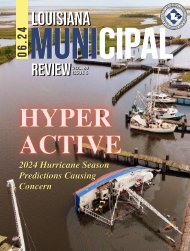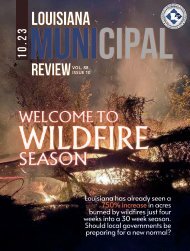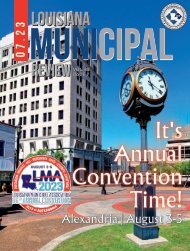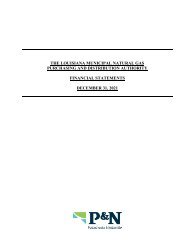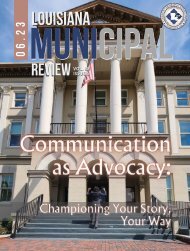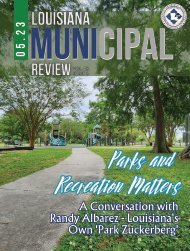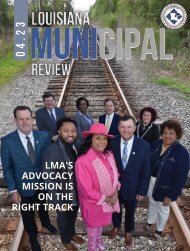05 May 2024 Final
You also want an ePaper? Increase the reach of your titles
YUMPU automatically turns print PDFs into web optimized ePapers that Google loves.
UNITED STATES DEPARTMENT OF AGRICULTURE – RURAL DEVELOPMENT<br />
Community Facilities Programs Assist with Municipal Projects<br />
The United States Department<br />
of Agriculture Rural<br />
Development focuses on<br />
community development by<br />
providing a variety of lending<br />
options that support the<br />
growth and sustainability of<br />
communities. Essential community<br />
infrastructure is key<br />
in ensuring that rural areas<br />
enjoy the same basic quality<br />
of life, as well as services enjoyed<br />
by those in urban areas.<br />
Community Facilities Programs<br />
offer direct loans, loan<br />
guarantees, and grants to<br />
develop or improve essential<br />
public services and facilities<br />
in communities across rural<br />
America. These amenities<br />
help increase the competitiveness<br />
of rural communities<br />
in attracting and retaining<br />
businesses that provide employment<br />
and services for<br />
their residents.<br />
Public bodies, non-profit organizations,<br />
and federally<br />
recognized American Indian<br />
Tribes can use the funds to<br />
construct, expand, or improve<br />
facilities that provide health<br />
care, education, public safety,<br />
and public services. Projects<br />
include fire and rescue stations,<br />
village and town halls,<br />
health care clinics, hospitals,<br />
adult and childcare centers,<br />
assisted living facilities, rehabilitation<br />
centers, public<br />
buildings, schools, libraries,<br />
and many other community-based<br />
initiatives. Financing<br />
may also cover the costs for<br />
land acquisition, professional<br />
fees, and purchase of equipment.<br />
Below, you will find a<br />
comprehensive list of available<br />
grants along with a brief<br />
explanation of each grant.<br />
Community Facilities Direct<br />
Grant: Funds can be used to<br />
purchase, construct, and/or<br />
improve essential community<br />
facilities, purchase equipment,<br />
and pay related project<br />
expenses. Grant funds must<br />
be available. Applicants must<br />
be eligible for grant assistance,<br />
which is provided on a<br />
graduated scale with smaller<br />
communities with the lowest<br />
median household income<br />
being eligible for projects<br />
with a higher proportion of<br />
grant funds.<br />
Community Facilities Technical<br />
Assistance & Training<br />
Grant: USDA Rural Development<br />
provides TAT grants to<br />
eligible public bodies and private,<br />
nonprofit organizations)<br />
to provide technical assistance<br />
and/or training in support<br />
of essential community<br />
facilities programs. The maximum<br />
grant award is $150,000.<br />
Funds may be used to assist<br />
communities in identifying<br />
and planning for community<br />
facility needs, prepare reports<br />
and surveys necessary to request<br />
financial assistance to<br />
develop community facilities,<br />
prepare applications for financial<br />
assistance from Rural<br />
Development, and Improve<br />
administrative and financial<br />
operations management.<br />
Rural Community Development<br />
Initiative Grants: Facilitates<br />
housing, community<br />
facilities, and community and<br />
economic development projects.<br />
Grant funds can cover<br />
training sub-grantees to conduct<br />
homeownership or minority<br />
business entrepreneur<br />
education, providing technical<br />
assistance to sub-grantees<br />
on strategic plan development,<br />
researching and identifying<br />
alternative funding<br />
sources, preparing boards<br />
of directors, and creating<br />
training tools such as videos,<br />
workbooks, or reference<br />
guides. Grants range from<br />
$50,000 - $250,000, and there<br />
is a matching fund requirement<br />
equal to the amount of<br />
the grant award.<br />
Tribal College Initiative<br />
Grants: Funds capital improvements<br />
to educational<br />
facilities and for cultural<br />
projects at 1994 Land Grant<br />
Institutions (Tribal Colleges).<br />
Funds can be used for infrastructure<br />
development or<br />
upgrades, along with equipment<br />
purchases for schools,<br />
libraries, and dormitories.<br />
Grants of up to $250,000.<br />
A minimum of five percent<br />
match is required.<br />
Through Rural Utilities Service<br />
Water and Environmental<br />
Programs (WEP), rural<br />
communities obtain the technical<br />
assistance and financing<br />
necessary to develop drinking<br />
water and waste disposal<br />
systems. Safe drinking water<br />
and sanitary waste disposal<br />
systems are vital not only<br />
to public health but also to<br />
the economic vitality of rural<br />
America. WEP provides funding<br />
for the construction of water<br />
and waste facilities in rural<br />
communities and is proud to<br />
be the only Federal program<br />
exclusively focused on rural<br />
water and waste infrastructure<br />
needs of rural communities<br />
with populations of<br />
10,000 or less. Rural Development<br />
is a leader in helping<br />
rural America improve the<br />
quality of life and increase the<br />
economic opportunities for<br />
rural people. WEP is administered<br />
through the National<br />
Office staff in Washington,<br />
DC, and a network of field<br />
staff in each State. Below, you<br />
will find a comprehensive list<br />
of available grants along with<br />
a brief explanation of each<br />
grant.<br />
Water and Waste Disposal<br />
Predevelopment Planning<br />
Grant: This program helps<br />
eligible low-income communities<br />
plan and develop applications<br />
for proposed USDA<br />
Rural Development water or<br />
waste disposal projects. The<br />
maximum grant award is<br />
Page 28<br />
LMR | MAY <strong>2024</strong>



